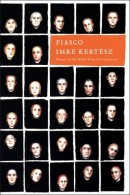 I recently received a copy of Imre Kertesz’s novel Fiasco
I recently received a copy of Imre Kertesz’s novel Fiasco.
Born in 1929, Kertesz was imprisoned at Auschwitz at age 14, and later was a prisoner at Buchenwald. He has called Fiasco, which recounts a prisoner’s return home to another nightmare, “fiction founded on reality.” That would seem to be the case with two of his previous books that are companions to this one, Fatelessness and Kaddish for an Unborn Child
, which I’d like to read.
Through his publisher, Melville House, I recently found this interview with Kertesz, conducted soon after he won the Nobel Prize in Literature in 2002. Here are two excerpts of the brief interview:
Q:You’ve said you feel lucky to have been at Auschwitz. Please excuse me for finding that shocking.
A: I experienced my most radical moments of happiness in the concentration camp. You cannot imagine what it’s like to be allowed to lie in the camp’s hospital, or to have a 10-minute break from indescribable labor. To be very close to death is also a kind of happiness. Just surviving becomes the greatest freedom of all.
***
Q: You’re the first Hungarian to win a Nobel literature prize. How is it to be getting a hero’s welcome?
A: It’s very strange for me because I’m certainly no hero. I’ve always looked on my writing as a very private matter. For decades I had no audience and lived on the fringes of society.
Q: You’ve said that it’s easier to write literature in a dictatorship than in a democracy.
A: That was too sweeping a statement, but there’s a truth to it. Because I didn’t write what the communist government wanted to see, I was cut off and alone with my work. I never thought my book would ever be published, and so I had the freedom to write as radically as I wanted, to go as deep inside as I wanted. In a democracy you have to find a market niche, make sure a novel is “interesting” and “spectacular.” That may be the toughest censorship of all.

